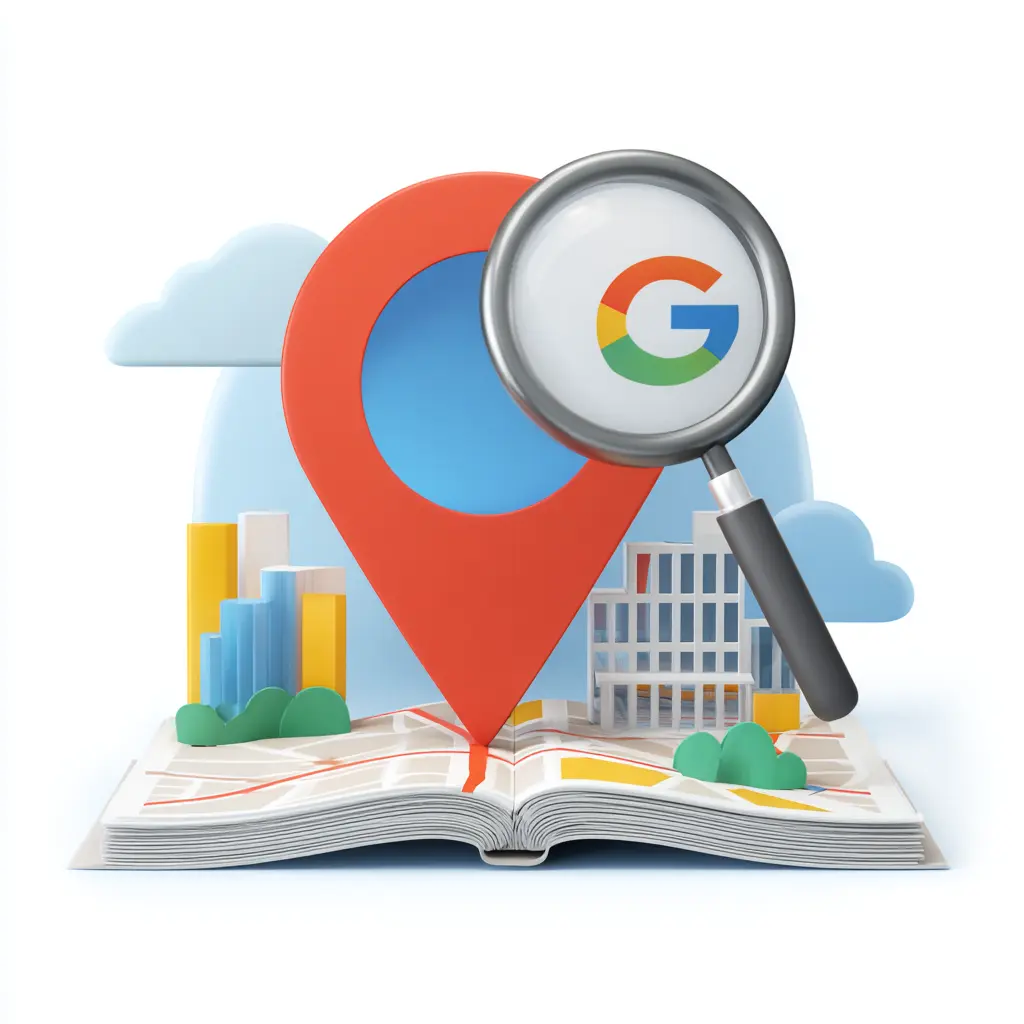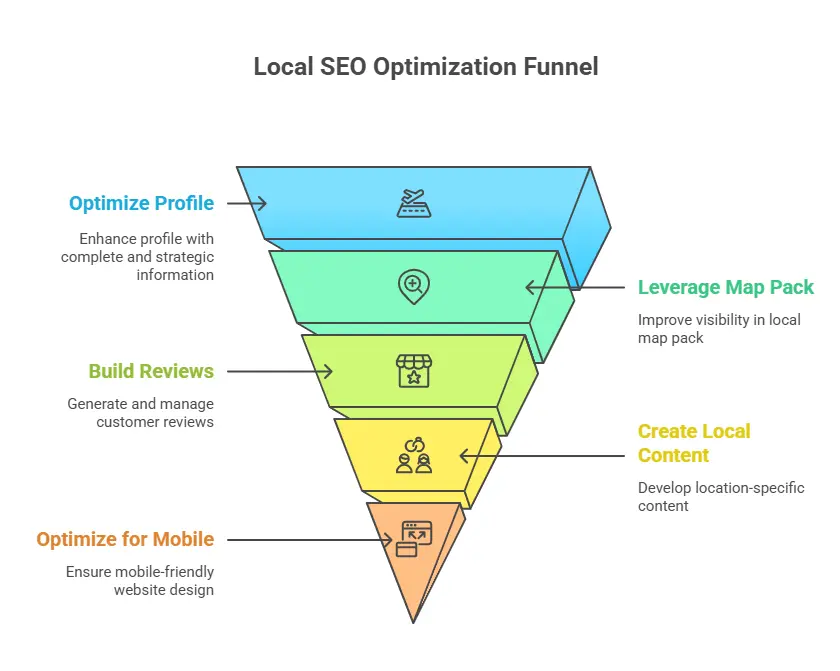As business owners, we should all fear this scenario: A potential customer in your area searches for exactly what you offer, but instead of finding your business, they discover your competitor’s listing at the top of Google’s results.
That missed opportunity just cost you a sale or a lead—and this happens more often than you might realize.
Click the Play Button above to hear a podcast of this blog article.
We’ve worked with hundreds of businesses over the past 30 years, and one pattern consistently emerges: companies that master local SEO for improved visibility don’t just survive in competitive markets—they dominate them.
The businesses that understand local search optimization generate significantly more qualified leads, enjoy higher conversion rates, and build stronger community recognition than those that don’t.
But here’s what might surprise you: 98% of consumers now use the internet to find local business information, yet 58% of businesses still don’t prioritize local SEO. This creates an enormous opportunity for businesses willing to invest in proper local search optimization.
In this comprehensive guide, we’ll walk you through the exact strategies on how to improve local search rankings, increase online visibility and get new customers for local business by focusing on:
- What Is Local SEO and Why Is it Important
- The 2026 Local SEO Strategy Framework
- Advanced Local SEO Services for 2026
- How to Get New Customers and Measure Local SEO Success
- Common Local SEO Mistakes to Avoid
- Creating Your 2026 Local SEO Action Plan
What Is Local SEO and Why Is it Important
The numbers tell a compelling story about the power of local search optimization. Nearly half of Google’s 8.5 billion daily searches are users seeking something local, meaning businesses have a substantial chance to tap into a vast audience right at their fingertips. More importantly, 28% of individuals who search locally end up purchasing within a day.
For business owners, this represents one of the most direct paths to revenue generation available in digital marketing today. Unlike traditional advertising that casts a wide net hoping to catch interested prospects, local SEO puts your business directly in front of people who are actively searching for your services in your area.
The Competitive Advantage Data
Recent industry research reveals several key insights that smart business owners are leveraging:
Market Opportunity: 99% of people have used the internet to look up information about a local business in the past year, while 96% of people find out about businesses near them through online searches.
Mobile Intent: 88% of consumers who conduct a local search on their smartphone visit or call a store within a day, demonstrating the immediate commercial value of local search visibility.
Trust Factor: Customers are far more likely to trust a business if they come across a complete Business Profile on search and Google Maps.
What we’ve observed in our client work is that businesses implementing comprehensive local SEO strategies typically see a 40-70% increase in qualified leads within the first six months.
In fact, as part of Avita group’s onboarding strategies, it’s one of the first questions we ask: Do you have a Google Business Profile? If not, it’s a Month One action item in our digital marketing arsenal.
Why?
Because local SEO isn’t just about being found—it’s about being found by the right people at the right moment in their buying journey.
The 2026 Local SEO Strategy Framework
Based on our analysis of current ranking factors and successful client campaigns, properly setting up your Google Business Profile is key to ranking Number One in the local pack.
Here’s the strategic framework that drives results:
1. Master Your Google Business Profile
Your Google Business Profile (formerly Google My Business) serves as the cornerstone of local search success. Verified businesses receive over 21,643 views each year in Google searches, making optimization essential.
Critical Optimization Elements:
Business Name & Categories: Choose your primary category carefully—it’s one of the strongest ranking signals. Your business name should be consistent across all platforms and include relevant keywords naturally, but avoid keyword stuffing that violates Google’s guidelines.
Complete Business Information: Include comprehensive details about your services, hours, contact information, and service areas. Customers are more likely to trust a business if they come across a complete Business Profile.
Strategic Description Writing: Craft a compelling 750-character description that includes your primary keywords, explains your unique value proposition, and includes a clear call to action. Focus on what you do, who you serve, and why customers should choose you.
2. Leverage the Local Map Pack Advantage
Businesses listed in the Google local map pack will clearly get more calls and website clicks, compared to those ranked between 4-10. This makes Map Pack optimization crucial for visibility.
Here are nine ways to get listed in Google’s local pack. Now once there, you need to optimize your profile for maximum performance.
Map Pack Success Strategies:
- Ensure NAP (Name, Address, Phone) consistency across all online listings
- Optimize for local keywords that include your city or service area
- Build citations from relevant local directories and industry associations
- Focus on proximity relevance by targeting nearby neighborhoods and landmarks
3. Build a Review Generation System
We’ve now hit you over the head with stats on how many consumers consistently check online reviews when exploring local businesses.
But it’s worth reinforcing: getting reviews and managing reviews are critical components of local SEO success.
Systematic Review Approach:
Proactive Review Requests: Implement systems to request reviews from satisfied customers immediately after positive service experiences. Email follow-ups, text campaigns, and in-person requests all contribute to steady review generation.
Review Response Strategy: Respond to all reviews—positive and negative—with personalized, helpful responses. This demonstrates customer care and can include relevant keywords naturally.
Review Content Optimization: Encourage customers to mention specific services or products in their reviews, as this creates valuable keyword content for local search rankings.
4. Create Location-Specific Content
Content marketing remains one of the most effective local SEO strategies.
Content Strategy Framework:
Local Landing Pages: Create dedicated pages for each service area you serve, including neighborhood-specific information, local landmarks, and community connections.
We have one client that specializes in outsourced IT support in Los Angeles. But we noticed that he had no presence in the many suburbs of the city.
Thus, we created unique pages for nearly 20 specific smaller cities within LA County using a variety of keyword approaches such as “(city)+IT support”.
Within three months, they were ranking in the Top Three for searches like “Hollywood IT support” and “Pasadena IT support”. And even though the monthly volume was lower than “Los Angeles IT support”, the competition wasn’t as fierce, and the results were super targeted.
As a result, visitors to their website increased by more than 20% by the third month of implementing this strategy.
Community Involvement Content: Document your business’s involvement in local events, sponsorships, and community activities. This content naturally attracts local backlinks and demonstrates community connection.
Subscribing to your local Chamber of Commerce also helps create local credibility.
Local Industry Insights: Publish content addressing local market conditions, regulations, or trends specific to your area and industry. You should even consider hosting local events at your shop such as quiz nights or special wines of the world nights to drive in new potential customers. Again depending on the nature of your business.
5. Optimize for Mobile
Searches on mobile devices naturally grow by leaps and bounds every year. So it’s a no-brainer that small businesses with mobile-friendly websites see a far higher conversion rate compared to those without.
Mobile Optimization Checklist:
- Ensure fast page loading speeds (under 3 seconds)
- Implement responsive design that works across all devices
- Use click-to-call buttons for easy contact
- Optimize for “near me” and conversational keyword phrases
Advanced Local SEO Services for 2026
Citation Building and NAP Consistency
Consistent business information across the web signals trustworthiness to search engines. Focus on:
- Building citations in industry-specific directories
- Ensuring consistent formatting of business information
- Monitoring and correcting inconsistencies across platforms
- Prioritizing high-authority local and industry directories
Local Link Building Strategies
Quality backlinks from local sources significantly impact local search rankings:
Community Partnerships: Partner with local nonprofits, chambers of commerce, and business associations for natural link opportunities.
Local Media Relations: Engage with local news outlets, blogs, and industry publications for coverage and backlinks.
Customer Success Stories: Create case studies featuring local customers, which often generate organic links and social shares.
Schema Markup Implementation
Structured data helps search engines understand your business information. While it sounds like complex programmer stuff, it’s really fairly easy to implement properly.
Or, you can hire a local SEO agency to help with the heavy lifting for things like:
- Implement LocalBusiness schema markup
- Include service area markup for service-based businesses
- Add review schema to enhance search result appearance
- Use FAQ schema for location-specific questions
How to Get New Customers and Measure Local SEO Success
Successful local SEO requires consistent monitoring and optimization.
Key performance indicators include:
Ranking Metrics: Track rankings for target local keywords and monitor Map Pack appearances.
Traffic Analytics: Monitor organic traffic from local searches and track conversion rates from different traffic sources.
Business Profile Metrics: Review Google Business Profile insights for views, clicks, calls, and direction requests.
Conversion Tracking: Measure phone calls, form submissions, and in-store visits generated from local search traffic.
Common Local SEO Mistakes to Avoid
Through our client work, we’ve identified several critical mistakes that limit local search success:
Inconsistent Business Information: Variations in business name, address, or phone number across directories confuse search engines and customers.
Neglecting Google Business Profile: Incomplete profiles, old photos, and reviews with no response signal neglect to potential customers.
Generic Content: Content that could apply to any location fails to establish local relevance and authority.
Ignoring Mobile Experience: Poor mobile experiences drive away potential customers and hurt search rankings.
Creating Your 2026 Local SEO Action Plan
To implement these strategies effectively, follow this prioritized approach:
Week 1-2: Audit and optimize your Google Business Profile completely, ensuring all information is accurate and compelling.
Week 3-4: Conduct a citation audit and begin building consistent local directory listings.
Month 2: Launch a systematic review generation campaign and begin responding to all existing reviews.
Month 3: Create location-specific landing pages and begin publishing local content regularly.
Ongoing: Monitor performance metrics, continue content creation, and refine strategies based on results.
***
Other than AI-related search emphasis, a local SEO strategy represents one of the most significant opportunities for business growth in 2026. With the majority of consumers still using online search to find local businesses, many companies still fail to optimize properly, giving early adopters a substantial competitive advantage.
For businesses willing to invest in comprehensive local search optimization, the potential returns far exceed the investment required.
Remember, your competition is likely reading similar advice. The difference between businesses that succeed and those that struggle lies in execution, consistency, and commitment to long-term strategy implementation.
People Also Ask
How long does it take to see local SEO results?
Most businesses begin seeing local SEO improvements within 3-6 months of implementing comprehensive optimization strategies. However, significant ranking improvements and sustained traffic growth typically develop over 6-12 months as search engines recognize consistent optimization efforts and content quality.
What’s the most important local SEO ranking factor?
Google Business Profile optimization combined with consistent NAP (Name, Address, Phone) information across the web represents the foundation of local search success. However, customer reviews, local content creation, and mobile optimization all contribute significantly to overall rankings.
How much should a small business invest in local SEO?
Local SEO investment varies based on market competition and business goals. Most small businesses see positive ROI with monthly investments of $1,000-$3,000 for comprehensive local optimization, though results depend on consistent implementation and market-specific strategies.
Can I do local SEO myself or do I need an agency?
While basic local SEO tasks can be handled internally, comprehensive local search optimization requires significant time, technical knowledge, and ongoing monitoring. Many businesses find better ROI working with a premier digital marketing agency that can implement advanced strategies while business owners focus on core operations.
About Los Angeles Digital Marketing Agency – Avita Group
Avita Group is a growth-focused digital marketing agency in California. Our clients often have had previous agency experiences and ultimately find a long-term home with Avita Group.
We specialize in organic Search Engine Optimization (SEO), Pay Per Click (PPC) campaign management, Online Reputation Management (ORM), website creation and conversion rate optimization.
The Avita Group team boasts a collective experience of over 30 years in the industry led by Founder and CEO, Brad Weber, and has worked with a variety of multi-million dollar companies to help them improve their ROI, build better brand awareness, and mitigate negative online reviews.
Contact us for a free consultation to evaluate how we can transform and elevate your business.



